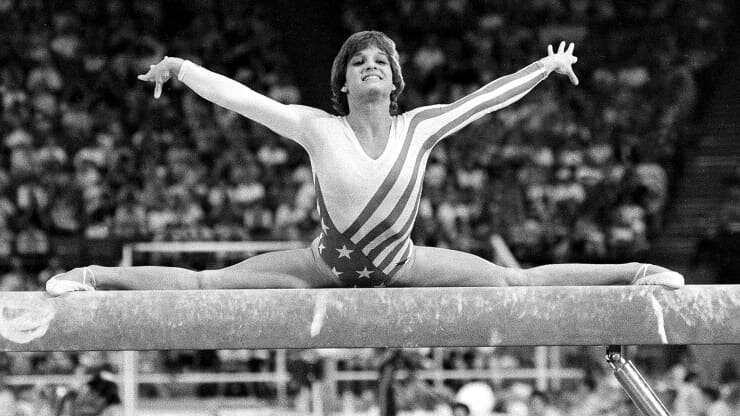We Are the Champions
I am a huge fan of the Olympics. Growing up, my family devotedly watched the Olympic broadcast with zeal. As the Olympic theme music started and the five rings twirled across the TV screen, we settled in for an evening of magnificent emotions. Even as a young kid, I recognized that this was a moment of ultimate importance. From the solemnity of the commentary to the expressions of determination on the athletes’ faces, everything demanded respect.
As a young gymnast and then diver, I shared the aspiration of other kids around the world to try and reach that level of competition. I followed celebrity Olympians like Nadia Comăneci, Mary Lou Retton and Dominique Dawes, Greg Louganis, Mary Ellen Clark, and Gao Min. I had posters in my room and practiced standing on makeshift podiums in the backyard.
Mary Lou Retton, Summer Olympic Games in Los Angeles., 1984 by Suzanne Vlamis | AP
I’m telling you this because I’ve been fascinated by some of the stories coming out of the Tokyo games this year – and I see lessons we can all absorb, especially as artists. First and foremost, the decision of athletes like Simone Biles and Naomi Osaka to pull out of major competitions for the sake of their mental health. These women are already champions, holding multiple medals and titles – and they kept pushing their limits.
I question those who criticize their decision to step back and regroup. Instead, they should be applauding the courage of athletes who choose wellness over winning. And we should all try to follow their example when we recognize the risks of anxiety and stress.
For artists in particular, I think this rings true after you’ve had a series of successes in your career. Maybe you’ve had several sales or exhibitions or even media attention, then the pressure builds. Some artists feel trapped when they become known for a certain style and have to repeat the same work over and over. Or they may have a collector or gallery putting pressure on them to be more prolific.
Artists compromise a lot. They sell themselves short because opportunities are rare and the competition is fierce. The physical and mental strain of creation, rejection, and expectation can end an artistic career. It is crucial to set boundaries and protect the integrity of your practice.
Today’s Olympic athletes have opened a door leading to more safe and sane competition. Osaka and Biles (and their allies) have made it okay to say NO. Although their decisions must have been excruciating, they had the courage to put their mental health first – to survive, in order to compete as a happy and whole person.
So, my takeaway from these Olympic games is this: Know Yourself and Protect Yourself
Celebrate your wins, but also own your weaknesses. Accept them as facets of your talents — yin and yang. Reframe your feelings of doubt and failure into motivational moments because those are the feelings that make us try harder. Embrace the struggle as something key to your success.
Mary Lou Retton once said, “When people see us standing on the podium and the medal stand with gold medals draped around your neck... that’s just the pinnacle of our success, but all of us have a story of struggle, a story of overcoming adversity to actually get there.”
While you are struggling and growing your practice, be sure to protect yourself. Surround yourself with a supportive team and don’t fear the expectations of outsiders. Anticipate rising anxiety by paying attention to your body. And like a true Olympic champion, stand up for your right to say NO. Don’t sacrifice your art or your well-being for short-term wins. As the saying goes - you must live to fight another day.


